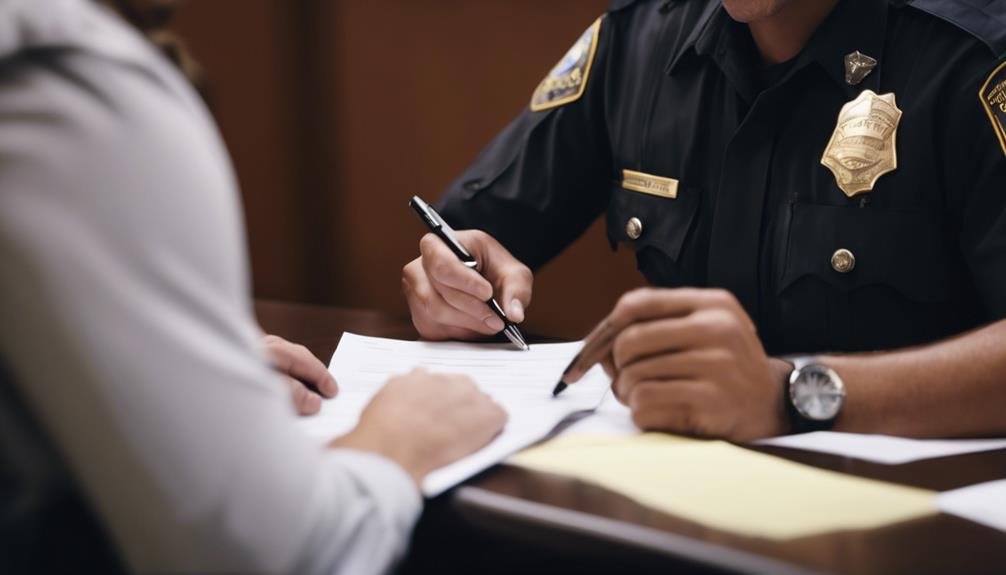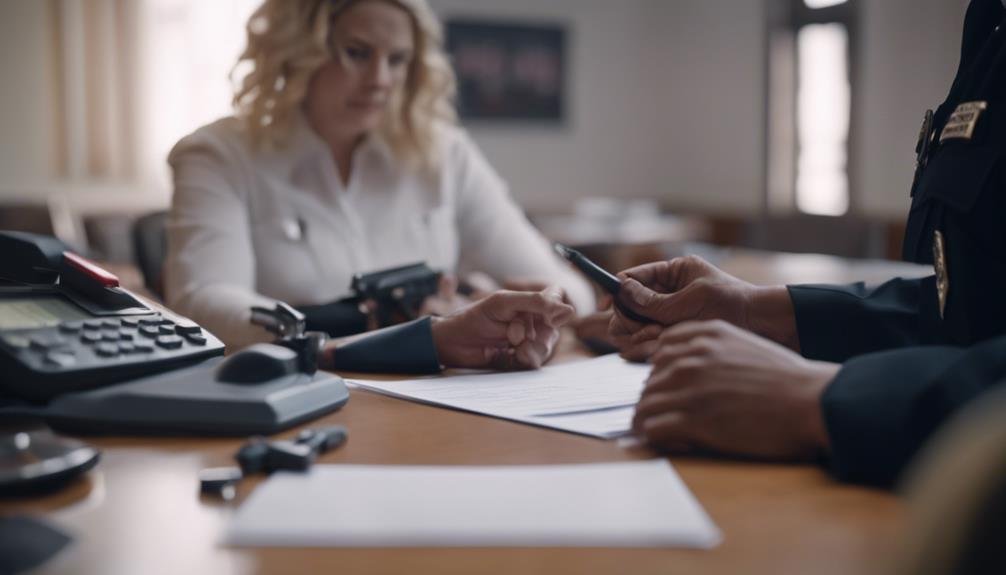If you’re facing domestic violence, start by contacting law enforcement with details like date, time, and evidence. Seek support from Victim Services or a special unit. Consider protective orders to safeguard well-being and hold the abuser accountable. Document incidents, injuries, and evidence meticulously for legal purposes. Connect with advocates or lawyers for guidance on safety planning and legal steps. Understand the legal process to effectively navigate reporting. Remember, taking these initial steps is essential in your journey towards safety and justice.
Key Takeaways
- Contact law enforcement promptly with incident details.
- Seek assistance from Victim Services or Special Crimes Unit.
- Document evidence like injuries, messages, and witnesses.
- Obtain protective orders for legal protection.
- Consult with advocates or attorneys for legal guidance.
Contacting Law Enforcement
When reporting domestic violence, it’s crucial to reach out to law enforcement promptly. This can be done through various channels such as visiting a police station, calling the emergency hotline, or submitting an online report via the police department’s website.
It’s essential to provide key information when reporting domestic violence. This includes details such as the date, time, and location of the incident, information about the perpetrator(s), what happened, any evidence or witnesses, and your contact information.
Remember, you aren’t alone in this process. Seek assistance from the Victim Services Unit or Special Crimes Unit for additional support in making a report. These specialized units are trained to handle cases of domestic violence with care and understanding.
Consider involving a domestic violence service for guidance and support throughout the reporting process. If needed, you can make a report at a hospital or police station. It might be helpful to bring along a supportive friend, family member, or advocate for assistance. You deserve to feel safe and supported during this challenging time.
Seeking Protective Orders
To safeguard your safety and well-being in domestic violence situations, seeking protective orders can provide vital protection and support as you navigate through this challenging time.
Protective orders are essential legal documents designed to protect individuals from further abuse or threats by their abusive partners. These orders require evidence of violence or threats to be issued, and violating them can lead to criminal charges against the abuser.
There are different types of protective orders, such as emergency protective orders, temporary restraining orders, and final protective orders, each offering varying lengths of protection.
By seeking a protective order, you empower yourself with a legal tool that mandates specific actions the abuser must adhere to, such as maintaining a distance from you or your residence.
Documenting Evidence
Begin by meticulously documenting all incidents of domestic violence that you experience, including important details like dates, times, locations, and specific occurrences. This written record serves as vital evidence when reporting abuse.
Additionally, take photographs of any injuries or damages resulting from these incidents. These visual records provide tangible proof of the harm inflicted.
Make sure to keep any threatening messages, emails, or voicemails you receive as they can demonstrate the abusive behavior you’re facing. Furthermore, save medical records that document any injuries sustained during violent episodes. These records can serve as medical evidence of the abuse.
Consider obtaining witness statements or testimonies from individuals who’ve observed the abusive behavior towards you. These testimonies can further validate your account of the incidents.
Consulting With Advocates or Attorneys
Curious about how advocates or attorneys can assist you in moving through the legal complexities of domestic violence cases? When facing such difficult situations, seeking legal assistance is essential to understanding your legal rights and ensuring your safety.
Advocates can provide valuable guidance on safety planning, legal resources, and understanding the Family Code to protect yourself from domestic violence. They can assist in obtaining protective orders, accessing victim compensation programs, and supporting you in advocacy efforts.
Specialized attorneys can offer legal representation in obtaining protective orders, filing for divorce, handling lawsuits, and communicating with the abuser on your behalf. Consulting with these professionals can empower you to make informed decisions about your legal options, such as seeking custody or taking legal action against the perpetrator.
Navigating Legal Process

Understanding the legal process for reporting domestic violence involves maneuvering through various steps, including filing police reports and obtaining protective orders. Legal advocates play an important role in guiding you through this process, explaining your rights, and providing the necessary support during what can be a challenging time.
When reporting domestic violence legally, it initiates investigations that may involve evidence collection to support your case. These investigations can also reveal the legal options available to you.
Seeking assistance from organizations like the National Domestic Violence Hotline can offer valuable resources and guidance on navigating the legal system effectively. Remember to document injuries, damages, and incidents meticulously. Additionally, consider taking safety precautions and obtaining protection orders to safeguard your well-being during this legal journey.
Trust in the process, and know that you aren’t alone in seeking justice and protection.
Frequently Asked Questions
What Are the Laws on Domestic Violence in Texas?
In Texas, laws on domestic violence aim to protect victims and hold offenders accountable. Legal ramifications include obtaining protective orders, reporting to law enforcement, managing court proceedings, accessing victim support, counseling services, and seeking justice.
How Do You Deal With Abuse Cases?
When dealing with abuse cases, remember you’re not alone. Reach out to support resources for guidance and safety planning. Collect evidence, seek legal options, understand the reporting process, consider protective orders, utilize counseling services for healing.
Conclusion
As you take the steps to report domestic violence legally, remember that you aren’t alone in this journey. Like a compass guiding you through a stormy sea, the legal system can provide the protection and justice you deserve.
Trust in your strength and resilience as you navigate these difficult waters, and know that there are advocates and attorneys ready to support you every step of the way.
You’re a warrior, standing tall against the tide.







